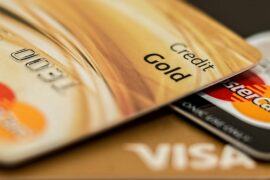This article may contain references to products or services from one or more of our advertisers or partners. We may receive compensation when you click on links to those products or services. Nonetheless, our opinions are our own.
The information presented in this article is accurate to the best of our knowledge at the time of publication. However, information is subject to change, and no guarantees are made about the continued accuracy or completeness of this content after its publication date.
- How Many Credit Cards Are Too Many?
- Benefits of Having a Few Credit Cards
- The risks of Having Too Many Credit Cards
- Finding the Right Number of Credit Cards
- Tips to Manage Your Credit Cards Effectively
- FAQs
- How many credit cards should I have?
- Can having too many credit cards hurt my credit score?
- How can I manage multiple credit cards effectively?
- Should I close unused credit cards?
- What is the best way to use credit cards for rewards?
- Does having multiple cards help my credit score?
- How do I know if I have too many credit cards?
- Final Thoughts
- Recommended Reads
How Many Credit Cards Are Too Many?
Have you ever pondered the limit of credit cards? While there’s no one-size-fits-all answer, the right number depends on your spending habits, financial goals, and ability to manage payments responsibly. According to Experian, the average American has three to four credit cards, balancing benefits and manageability. Used wisely, credit cards can help you earn rewards, improve your credit score, and provide financial security. If mismanaged, finances can lead to debt and stress.
Benefits of Having a Few Credit Cards
Having a limited number of cards can give you significant advantages without overwhelming your finances.
Maximize Rewards
Different cards offer unique perks:
- Groceries and everyday spending: Earn up to 2% cashback.
- Travel and dining: Accumulate airline miles or hotel points.
- Special promotions: Seasonal bonuses or 0% APR offers for large purchases.
By strategically using each card, you can maximize rewards without carrying unnecessary debt.
Improve Your Credit Score
Your credit utilization ratio, the percentage of available credit you’re using, plays a major role in your credit score. Keeping it under 30% across all cards signals responsible borrowing and can boost your score over time.
Extra Security for Emergencies
Having an extra card can act as a backup for unexpected expenses, such as car repairs or medical bills, providing peace of mind without relying on high-interest loans.
The risks of Having Too Many Credit Cards
While some cards can help, too many can backfire.
Payment Chaos
Juggling multiple due dates increases the chance of missed payments, which can lead to late fees and a lower credit score.
Debt Spiral
If you rely on credit to cover daily expenses, carrying balances on multiple cards compounds high interest fees, making it harder to pay off debt.
Unused Cards Drain You
Cards that have high annual fees or do not offer rewards can end up costing you money. Regularly review your accounts and consider closing underused cards strategically to avoid negative impacts on credit.
Voted "Best Overall Budgeting App" by Forbes and WSJ
Monarch Money helps you budget, track spending, set goals, and plan your financial future—all in one app.
Get 50% OFF your first year with code MONARCHVIP
Finding the Right Number of Credit Cards
Financial experts typically recommend three to five cards for most people. This allows you to diversify benefits without feeling overwhelmed. Ask yourself:
- Can you pay off balances in full each month?
- Do you avoid unnecessary debt?
- Are your cards aligned with your spending goals?
If you answer yes, you’re likely managing the right number.
Tips to Manage Your Credit Cards Effectively
- Create a budget:Track income, expenses, and credit usage with apps like Mint or YNAB.
- Set reminders: Use alerts or autopay to avoid late fees.
- Review rewards programs:Make sure each card aligns with your spending habits.
- Check credit reports regularly:Use AnnualCreditReport.com to monitor credit health.
- Close or downgrade wisely:Keep older cards open for credit history unless fees outweigh benefits.
Following these steps ensures your credit cards work for you, not the other way around.
FAQs
How many credit cards should I have?
Most financial experts recommend three to five cards. You can earn rewards within this range, maintain a healthy credit score, and avoid becoming overwhelmed by due dates.
Can having too many credit cards hurt my credit score?
Yes. Opening too many cards in a short period can lower your credit score due to hard inquiries and increase the risk of high credit utilization if balances are carried on multiple cards.
How can I manage multiple credit cards effectively?
Set up autopay for all bills, track spending with budgeting apps like Mint or YNAB, review rewards programs to maximize benefits, and keep older accounts open to maintain credit history.
Should I close unused credit cards?
Closing cards can impact your credit utilization and credit history. Only close cards if the annual fee outweighs the benefits or if the card is no longer useful.
What is the best way to use credit cards for rewards?
Assign cards for specific categories like groceries, travel, or dining; pay balances in full to avoid interest fees; and take advantage of sign-up bonuses and seasonal promotions.
Does having multiple cards help my credit score?
Yes, if managed properly. Using multiple cards responsibly can improve credit utilization and show lenders you’re a responsible borrower, boosting your credit score over time.
How do I know if I have too many credit cards?
If you struggle with missed payments, high balances, or confusion over due dates, you may have too many cards. Assess your spending habits and focus on managing a smaller, strategic number of cards.
Final Thoughts
Managing credit cards wisely requires balancing rewards, security, and spending habits. Most people benefit from three to five strategically chosen cards. Using them responsibly can improve your credit score, offer extra security, and help you maximize rewards while avoiding debt and financial stress. With the right approach, your credit cards can become a tool for financial growth rather than a source of worry.

Reviewed and edited by Albert Fang.
See a typo or want to suggest an edit/revision to the content? Use the contact us form to provide feedback.
At FangWallet, we value editorial integrity and open collaboration in curating quality content for readers to enjoy. Much appreciated for the assist.
Did you like our article and find it insightful? We encourage sharing the article link with family and friends to benefit as well - better yet, sharing on social media. Thank you for the support! 🍉
Article Title: How Many Credit Cards Should You Have?
https://fangwallet.com/2025/08/22/how-many-credit-cards-should-you-have/The FangWallet Promise
FangWallet is an editorially independent resource - founded on breaking down challenging financial concepts for anyone to understand since 2014. While we adhere to editorial integrity, note that this post may contain references to products from our partners.
The FangWallet promise is always to have your best interest in mind and be transparent and honest about the financial picture.
Become an Insider

Subscribe to get a free daily budget planner printable to help get your money on track!
Make passive money the right way. No spam.
Editorial Disclaimer: The editorial content on this page is not provided by any of the companies mentioned. The opinions expressed here are the author's alone.
The content of this website is for informational purposes only and does not represent investment advice, or an offer or solicitation to buy or sell any security, investment, or product. Investors are encouraged to do their own due diligence, and, if necessary, consult professional advising before making any investment decisions. Investing involves a high degree of risk, and financial losses may occur including the potential loss of principal.
Source Citation References:
+ Inspo
There are no additional citations or references to note for this article at this time.












































